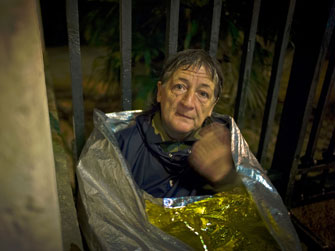
I went to see Claus Drexel’s Au Bord du Monde (On the Edge of the World), a documentary about homeless people in Paris, because I wanted to know more. How do people end up on the street? Why do they stay? How do they protect themselves from danger and survive from day to day? Where are the social services that are supposed to help them?
The film answers few of these questions, however. It begins with magnificent picture-postcard views of the monuments of Paris at dawn, shown to the swelling strains of Wagner’s “Parsifal.” Gradually, we realize that each monument is the backdrop for a homeless person’s life. Drexel cuts back and forth between interviews with 10 of them, filmed at night over a period of one year.
Wenceslas, well-dressed and highly articulate, sleeps in a tent by a busy road with his well-stocked luggage caddy and gets up every morning at four or five to pack up all his belongings and trundle them across Paris to forage for unsold food in supermarket trash bins. We wonder why this intelligent, resourceful, well-organized man does not have a job, but the subject never comes up.
The most heart-wrenching of the film’s subjects is Christine, a sad, sweet-faced older woman who is articulate but vague and seems resigned to her fate. She sleeps (as much as is possible) sitting up, wrapped in sleeping bags and a Mylar blanket, against the iron bars of the fence around the Jardin des Plantes. She tells the interviewer that she lost her home following an unexplained “agression” and that her children, one of whom has disappeared, are also living on the street. After seven years of this life, all she wants is to return home and be reunited with her children.
Pascal, who is also fairly articulate, has built himself a well-equipped cabin under a bridge. The only thing lacking, he says, is electricity. “I hardly ever leave here,” he says. “If I had electricity, I would never leave.” Every year, he puts up and decorates a Christmas tree next to his cabin.
Other subjects presented in the film are far worse off then these three, and some have obvious mental disabilities.
Presumably, the director knows the back stories of all his subjects, but for some reason he refuses to share them with us. Perhaps he thought that would be too commonplace and would interfere with the poetic, elegiac feeling he was striving for in this slow-moving documentary.
But who could remain indifferent at the sight of Christine shivering as she talks to the filmmaker while wet snow falls on her, or of Henri, who lives in a tunnel and never speaks to the camera, walking barefoot in circles on cold, wet pavement against the backdrop of the Christmas lights on the Champs-Élysées.
Throughout the film, Drexel emphasizes the contrast between the beauty of Paris and the tragic lives of the homeless. It’s a good point, but it is overstated here – we get it.
At the end of this deeply empathetic film, the sun rises over Paris but brings little hope of a bright new day for its subjects. The last scene is truly moving. The camera lingers on each person we have met, and his or her first name appears on the screen while we listen to the aria “Nessun Dorma” (“None Shall Sleep”) from Puccini’s Turandot.
The French tend to have a rather romantic view of the clochard. A grizzled, eloquent, lovable and fiercely independent philosopher, the cliché goes, he lives on the street and sleeps under bridges out of choice – think of Boudu in the film Boudu Saved from Drowning (1932). With the number of people living in the street today, however, that guilt-assuaging myth is getting harder and harder to maintain. One good thing about Au Bord du Monde is that it opens our eyes to the humanity of those we usually walk past every day with averted eyes.
Favorite